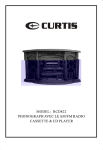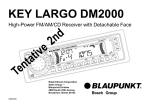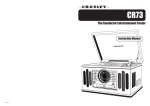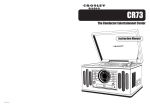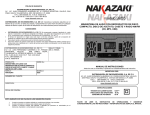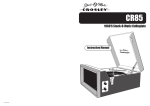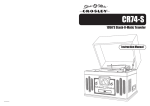Download Curtis RCD836 Stereo System User Manual
Transcript
IMPORTANT SAFETY INSTRUCTIONS FOR AUDIO PRODUCTS-READ THOROUGHLY OPERATION MANUAL MODEL: RCD836 PHONOGRAHPH WITH AM/FM RADIO, CASSETTE & CD PLAYER When using electrical products, basic precautions should always be followed including: 1. Read Instructions - All the safety and operating instructions should be read before the product is operated. 2. Retain Instructions - The safety and operating instructions should be retained for future reference. 3. Heed Instructions - All warnings on the product and in the operating instructions should be adhered to. 4. Follow Instructions - All operating and user instructions should be followed. 5. Cleaning - Unplug this product from the wall outlet before cleaning. Do not use liquid cleaners or aerosol cleaners. Use a damp cloth for cleaning. 6. Attachments - Do not use attachments not recommended by the product manufacturer as they may cause hazards. 7. Water and Moisture - Do not use this product near water-for example, near a bath tub,wash bowl, kitchen sink, or laundry tub, in a wet basement, or near a swimming pool, etc. 8. Accessories - Do not place this product on an unstable cart, stand, tripod, bracket, or table. The product may fall, causing serious injury to a child or adult, and serious damage to the product. Use only with a cart, stand, tripod, bracket, or table recommended by the manufacturer, or sold with the product. Any mounting of the product should follow the manufacturer's instructions, and should use a mounting accessory recommended by the manufacturer. 9. Transporting - A product and cart combination should be moved with care. Quick stops, excessive force, and uneven surfaces may cause the product and cart combination to overturn. 10. Ventilation - Slots and openings in the cabinet are provided for ventilation, to ensure reliable operation of the product and to protect it from overheating. These openings must not be blocked or covered. The openings should never be blocked by placing the product on a bed, sofa, rug, or similar surface. This product should not be placed in a built-in installation such as a bookcase or rack unless proper ventilation is provided or the manufacturer's instructions have been adhered to. 11. Power Sources - This product should be operated only from the type of power source indicated on the marking label. If you are not sure of the type of power supply to your home, consult your product dealer or local power company. For products intended to operate from battery power, or other sources, refer to the operating instructions. 12. Grounding or Polarization - This product may be equipped with a polarized alternating- current line plug (a plug having one blade wider than the other). This plug will fit into the power outlet only one way. This is a safety feature. If you are unable to insert the plug fully into the outlet, try reversing the plug. If the plug should still fail to fit, contact your electrician to replace your obsolete outlet. Do not defeat the safety purpose of the polarized plug. 13. Power-Cord Protection - Power-supply cords should be routed so that they are not likely to be walked on or pinched by items placed upon or against them, paying particular attention to cords at plugs, convenience receptacles, and the point where they exit from the product. 1 14. Lightning - For added protection for this product during a lightning storm, or when it is left unattended and unused for long periods of time, unplug it from the wall outlet and disconnect the antenna or cable system. This will prevent damage to the product due to lightning and power-line surges. 15. Power Lines - An outside antenna system should not be located in the vicinity of overhead power lines or other electric light or power circuits, or where it can fall into such power lines or circuits. When installing an outside antenna system, extreme care should be taken to keep from touching such power lines or circuits as contact with them might be fatal. 16. Overloading - Do not overload wall outlets, extension cords, or integral convenience receptacles as this can result in a risk of fire or electric shock. 17. Object and Liquid Entry - Never push objects of any kind into this product through openings as they may touch dangerous voltage points or short-out parts that could result in a fire or electric shock. Never spill liquid of any kind on the product. 18. Servicing - Do not attempt to service this product yourself as opening or removing covers may expose you to dangerous voltage or other hazards. Refer all servicing to qualified service personnel. 19. Damage Requiring Service - Unplug this product from the wall outlet and refer servicing to qualified service personnel under the following conditions: a. If the power-supply cord or plug is damaged. b. If liquid has spilled, or objects have fallen into the product. c. If the product has been exposed to rain or water. d. If the product does not operate normally by following the operating instructions. Adjust only those controls that are covered by the operating instructions, as an improper ajustment of other controls may result in damage and will often require extensive work by a qualified technician to restore the product to its normal operation. e. If the product has been dropped or damaged in any way, and if the product exhibits a distinct change in performance-this indicates a need for service. 20. Replacement Parts - When replacement parts are required, be sure the service technician has used replacement parts specified by the manufacturer or have the same characteristics as the original part. Unauthorized substitutions may result in fire, electric shock, or other hazards. 21. Safety Check - Upon completion of any service or repairs to this product, ask the service technician to perform safety checks to determine that the product is in proper operating condition. 22. Wall or Ceiling Mounting - The product should be mounted to a wall or ceiling only as recommended by the manufacturer. 23. Heat - The product should be situated away from heat sources such as radiators, heat registers, stoves or other products (including amplifiers) that produce heat. Precautions Safety Information CAUTION: 1. DO NOT REMOVE THE PROTECTIVE HOUSING. 2. USE OF CONTROLS AND ADJUSTMENTS OR PERFORMANCE OF PROCEDURES OTHER THAN THOSE SPECIFIED HEREIN MAY RESULT IN HAZARDOUS RADIATION EXPOSURE. 3. IF THIS PRODUCT DEVELOPS TROUBLE, CONTACT A QUALIFIED SERVICE CENTER, AND DO NOT USE THE PRODUCT IN A DEFECTIVE STATE. Safety Precautions WARNING: To reduce the risk of fire or electric shock, do not expose this appliance to rain or moisture. CAUTION: Use of controls or adjustments or performance of procedures other than those specified may result in hazardous radiation exposures. CAUTION RISK OF ELECTRIC SHOCK DO NOT OPEN To reduce the risk of electric shock: do not remove cover(or back). No user serviceable parts inside. Refer servicing to qualified service personnel. The lightning flash with arrowhead symbol, within an equilateral triangle, is intended to alert user to the presence of uninsulated "dangerous voltage" within the product's enclosure that may be of sufficient magnitude to constitute risk of electric shock to persons. The exclamation point within an equilateral triangle is intended to alert user to the presence of important operating and maintenance(servicing)instructions in the literature accompanying the appliance. CAUTION For Compact Disc Units Only: INVISIBLE LASER RADIATION WHEN OPEN AND INTERLOCK FAILED OR DEFEATED, AVOID DIRECT EXPORSURE TO LASER BEAM. ( See markings on the back of the unit.) CAUTION: To prevent electric shock, match wide blade of plug to wide slot, fully insert . 2 3 Listening to a Tape or Compact Disc Before Use Before Use Cassette Tape 1. Choose unit installation location carefully. Avoid placing it in direct sunlight or close to a source of heat. Also avoid locations subject to vibrations and excessive dust, cold or moisture. Keep away from sources that hum, such as transformers or motors. 2. Do not open the cabinet as this might result in damage to the circuitry or electrical shock. If a foreign object should get into the set, contact your dealer. 3. Be sure not to handle discs with dirty fingers. Never insert a disc that has a crack on the surface. 4. When removing the power plug from the wall outlet, always pull directly on the plug, never pull the cord. 5. To keep the laser pickup clean, do not touch it, and do not forget to close the disc tray. 6. Do not attempt to clean the unit with chemical solvents as this might damage the finish. Use a clean, dry cloth. 7. In order to shut off the power to this product completely, unplug the power cord from the wall outlet. Be sure to unplug the unit if you do not intend to use it for an extended period of time, such as a vacation. 8. Keep this manual in a safe place for future reference. Tape Handling: Do not store tapes in the following places: 1. On top of heaters, exposed to direct sunlight or in any other places with high temperatures. 2. Near speakers, on TV sets or amplifiers or where they would be exposed to strong magnetic fields. 3. Where humidity is high and in dirty, dusty places. 4. Avoid dropping or subjecting cassettes to excessive shocks. 5. As C-120 tapes are physically weak and could become entangled in the transport mechanism, do not use them. Beware of Condensation When the player (or a compact disc) is moved from a cold to a warm place or is used after a sudden temperature change, there is a danger of condensation. Water vapor in the air could condense on the mechanism or the laser pickup. If droplets of water form on these parts, correct playback will be impossible because the laser cannot read the information from the disc correctly. To prevent this, if you are going to use the player in a condition where condensation could occur, you should not use the player for 1 or 2 hours after plugging it into an AC outlet depending on the amount of condensation. If this is done, the player will stabilize at the temperature of its surroundings. Loading a Cassette tape: 1. Use your finger or a pencil to turn the cassette hub and take up any slack tape. Note: Avoid touching the tape .Fingerprints attract dust and dirt. 2. Press STOP/EJECT button to open cassette door. Note: The cassette holder cannot be opened during recording or play back. 3. Load the cassette tape with its open edge facing down. 4. Gently close the compartment door. MAINTENANCE: The heads and tape path should be cleaned and demagnetized periodically. (Cleaning materials not included) For U.S.A. This equipment has been tested and found to comply with the limits for a Class B digital device, pursuant to Part 15 of the FCC Rules. These limits are designed to provide reasonable protection against interference in a residential area. This device generates and uses radio frequency energy and if not installed and used in accordance with the instructions, it may cause interference to radio or TV reception. If this unit does cause interference with TV or radio reception you can try to correct the interference by one or more of the following measures: A) Reorient or relocate the receiving antenna. B) Increase the separation between the equipment and receiver. C) Plug the equipment into a different outlet so that it is not on the same circuit as the receiver. If necessary, consult the dealer or an experienced radio/TV technician for additional suggestions Cleaning Tape path Apply head cleaning fluid to a cotton swab or soft cloth, and lightly rub the heads, capstan and all metal parts in the tape path. Also clean the pinch roller using rubber cleaning fluid. ERASE HEAD CAPSTAN PRESSURE ROLLER RECORD/PLAYBACK HEAD Demagnetizing Heads: Be sure that the power is off, then demagnetize the heads using a demagnetizer. For details of its use, read its instructions. CAUTION: Changes or modifications to this equipment not expressly approved by Manufacturer for compliance could void the user's authority to operate this equipment. 4 CLEANING STICK 5 Compact Disc Preparation of Use Handing the Discs: This unit has been designed specifically for sound reproduction from compact discs bearing the mark. No other discs can be used. AUDIO 1. Connect the AC power cord. 1. Always place the compact disc in the disc tray with the label facing upward. (Compact discs can be played only on one side). 2. To remove a disc from its storage case, press down on the centre of the case and lift the disc out, holding it carefully by the edge. 2. The silver screw protects the phonograph chassis during transportation. If the speed of your phonograph seems slow or you hear a rubbing sound, adjust the screw with a coin to correct the balance of the turntable. HANDLE DISC ONLY AS SHOWN 3. Fingermarks and dust should be carefully wiped off the disc recorded surface with a soft cloth (not included) CLEAN FROM CENTER TO EDGE How To Replace The Turntable Stylus? 4. Never use such chemicals as record sprays, anti-static sprays or fluid, benzine or thinner to clean compact discs. Such chemicals will do irreparable damage to the disc's plastic surface. 5. Discs should be return to their cases after use to avoid serious scratches that could cause laser pickup to skip. 6. Do not expose discs to direct sunlight or high humidity and temperature for extended periods. Long exposure to high temperature can warp the disc. 7. Do not stick paper or write anything with a ballpoint pen on the surface of the label side. 8. Do not use irregular shaped CD's (octangonal, heart-shape, etc.) Which can damage the unit. Removing old stylus 1. Set a screwdriver at the tip of the stylus and push down to the direction "A". 2. Remove the stylus by pulling it forward and down. A Installing a new stylus 1. Hold the tip of the stylus and insert the other edge by pressing in the direction "B". 2. Push up in the direction "C" until it locks at the tip. C B Guide Pins (inside) 6 7 Basic Operation Listening to a Record 1. Power on. Connect the power plug into the wall outlet. 1. Press the PHONO button. 1 2. Select the source. PHONO Lights 2. Select player speed. 2 33 45 3. Adjust the volume. 6 4 7 5 78 8 3 5 2 9 3. Put a record onto the turntable. (Use 45 rpm adaptor when playing single record.) 10 1 VOLUME 3 4. Adjust the sub-bass volume. - 4. Remove the tone arm-rest holder. + 5. Lift the Que-lever and move the tone arm gently to the desired position over the record. SUB-BASS 5 6 4 7 6. Lower the Que-lever slowly. 2 5. Listening through Earphones/Headphones. 7. Return the tone arm to the tone arm-rest after reaching the end of the record. 4 PHONES The sound from all speakers is cut off. 8 9 CAUTION When the CD is stopped, press PLAY/PAUSE button within 3 seconds after pressing MUSIC SKIP button,or it will return to stopping state. Listening to CD 1. Press the CD button. Skipping tracks. Press once to go to the start of the next track. F.R Skip/search F.F CD 2. Open the tray, and place the CD on the tray. Press once to go to the start of the track currently being played. Press twice to go to the start of the previous track. 1 F.R Skip/search F.F OPEN /CLOSE 3. Close the tray and start playing the CD. 2 4 Lights OPEN/CLOSE 6 3 5 Listening to the Radio 1. Press the TUNER button to select the desired band (AM/FM). PLAY/PAUSE 1 Lights The CD will start playing from the first track. 2. Tune to the desired frequency. DO STOP UP WN 4 Stopping the CD play. TUNING 5 Pausing the CD play. 3. Antenna For a good FM reception,stretch the antenna wire and move it around until you get the desired station clearly. Flash CD should be placed on the tray with the label side up. PLAY/PAUSE Pressing the PLAY/PAUSE button will restart playing the CD. NOTE: Do not switch off the unit during CD-function, because it will damage the unit. CD should be placed on the tray with the label side up. 10 4. FM reception Any strong FM stereo is indicated by the FM stereo lndicator. For weak reception the unit switches automatically to MONO. 3 70 Light 98 100 80 90 100 11 Recording a Tape Listening to a Tape 1. Press the TAPE button. 1. Open the cassette door and insert the Blank tape you wish to record. 1 STOP/EJECT TAPE 2 2. Open the cassette door and insert a cassette tape. 2. Select the source from which you will record, using the input selector buttons (do not select TAPE) STOP/EJECT 3. Press the RECORD button to start recording. 2 3 4 5 6 3. Press the play ( RECORD ) button. 3 PLAY 1 4 5 The Play ( ) button will be pressed automatically. At the end of the cassette tape, the cassette will stop automatically. At the end of the cassette tape, the cassette will stop automatically. 4. Stopping the recording. STOP/EJECT 4. Stopping the tape playback. STOP/EJECT 5. Pausing the recording. PAUSE 6. Pausing the playback. 5. Fast forward and rewind. PAUSE Pressing the PAUSE button will restart recording the tape. Pressing the PAUSE button will restart playing the tape. Press STOP button to half fast forward or rewinding operations. 12 13 Specification Troubleshooting guide RECORD PLAYER section Motor ................................................DC servo motor Drive System......................................Belt Drive Speed ...............................................33-1/3rpm, 45rpm and 78rpm Wow & Flutter.....................................less than 0.25%(WTD) S/N Ratio .......................................... More than 50dB Catridge Type.....................................Ceramic Stereo Catridge Stylus................................................402-M208-165 Output Level ......................................160 ~ 380mV(5cm/sec at 1kHz) SPEAKER SYSTEM section Type..................................................3 - ways Impedance ........................................4 ohms for Tweeter speaker 6 ohms for Super Bass speaker 8 ohms for Stereo channel Input Power........................................Max. 5W for 8 ohms speaker Max. 10W for 4 ohms speaker Max. 25W for 6 ohms speaker GENERAL Power Requirements...........................AC 120V ~ 60 Hz (U.S.A. / Canada) Power consumption............................19W Dimension(W x H x D ).........................520 x 920 x 340mm Weight...............................................23.5kg Standard Accessories.........................Operating Instruction Booklet Warranty Card 45 rpm Adaptor 14 The whole unit CASSETTE DECK section Track System.....................................4 track, 2 channel stereo Tape speed ........................................4.8cm/sec Wow and Flutter..................................0.4%(WRMS) Frequency Response..........................125 to 6,300Hz +/-6dB Tape deck CD PLAYER section Frequency response............................60 to 20,000 Hz +/-4dB Signal-to-Noise Ratio.......................... 55dB (IEC-A) Problem Tuner unit TUNER section FM Section Frequency Range ...............................88 to 108 MHz AM Section Frequency Range................................530 to 1710 KHz (U.S.A. / Canada) In case of trouble with the unit, please look through this chart and see if you can solve the problem by yourse if before calling your dealer. CD Player AMPLIFIER section Output Power......................................2.0W + 2.0W (U.S.A. / Canada) Frequency Response...........................60 to 30,000Hz Cause Solution Power does not come on when the power switch is pressed Unit is unplugged Connect the unit to the AC power supply No sound comes out of the speakers The volume is turned down(to MIN) The input selector does not match the playback source Adjust the volume Re-select the input source The sound is noisy The unit is too close to a TV set or another similar appliance Turn off the TV or other appliance, and relocate the unit The cassette deck door can not be closed The cassette tape is not inserted properly Insert the cassette tape correctly The tape does not move The cassette tape is not inserted properly Insert the cassette tape correctly No sound from tape The tape heads are dirty Clean the tape heads Can not record The write-protect tabs on the cassette have been broken off The tape heads are dirty you are trying to record on metal (type IV) tape Tape over the holes with cellophane tape Clean the tape heads Use a normal (type I) tape When recording over a previously recorded tape, the original signal can still be heard The tape heads are dirty You are trying to record on metal(type IV) tape Clean the tape heads Use a normal(type I) tape The sound is distorted or faint The tape heads are dirty Clean the tape heads Can not listen to any station, or signal appears weak The station is not tuned in properly A TV set is being used nearby Tune in the station correctly Turn off the TV set The sound is distorted The antenna is not oriented properly Re-orient the antenna until reception improves Play stop immediately after starting to play the CD, or play pauses or stops during play The CD is inserted upside down The CD is dusty or dirty, or there is condensation on the CD Insert the CD with the printed side upper most Clean and dry the CD No sound The CD player is paused press the PLAY/PAUSE button Specific CD is noisy, or playback stops The CD is scratched, damaged or or skips warped The disc is very dirty 15 The CD should be changed Clean the CD








